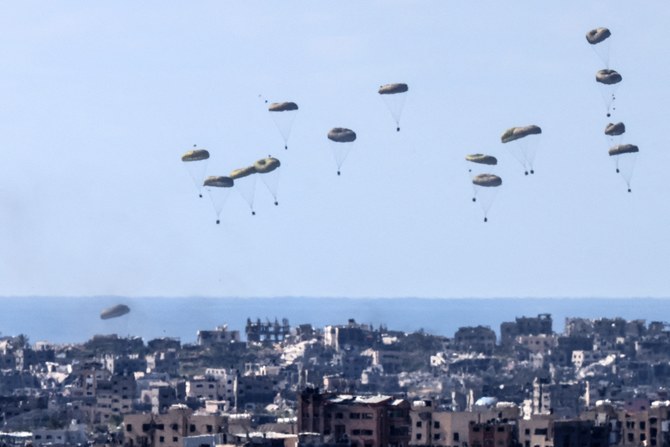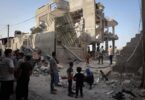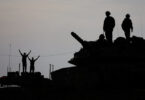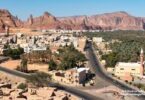Chris Doyle
Palestinians in Gaza must be confused. Most know that it is American bombs that Israeli forces have used to pulverize nearly every square centimeter of their besieged enclave. American food parcels are now landing on them too. Death or dinner; bombs or bread. Most Palestinians in Gaza probably have not watched or read “The Hunger Games,” but the feeling that their lives are being toyed with is strong.
Emphasizing the absurd lethal lottery of the aid drops, five Palestinians were killed and 10 injured when one pallet crashed into them after its parachute failed to open. The international community has violated so many of the cardinal principles of international law and aid delivery that trashing the “do no harm” principle seems barely worth a mention in this context, as 23 Palestinians have thus far died from starvation and dehydration. Correction: 23 Palestinians have been starved and dehydrated to death.
In Gaza, there are few large, clear drop zones, such as those used in Syria for example. The parachutes can land on dangerous, unsafe, semi-destroyed buildings. Winds, not least in the upper atmosphere, can carry them off course, which is why some pallets have landed in the Mediterranean. There are no forces to receive and secure the aid packages, let alone ensure that they get to the most needy. In fact, the fittest and strongest are most likely to get there first, not the ones dying of starvation. It becomes a dangerous scrum, as those surviving on grass and animal feed fight for every last morsel.
Yes, the current American leadership has developed a bizarrely last-minute aversion to seeing Palestinian babies and others dying of starvation. It does not look good, but then again nor did the carpet-bombing of much of Gaza. This conscience was barely pricked when schools, hospitals, mosques, churches and homes crumpled under the 900-kg bunker busting bombs the US had supplied.
President Joe Biden made the unusual step of slamming Israel in his State of the Union speech. “To the leadership of Israel, I say this: Humanitarian assistance cannot be a secondary consideration or a bargaining chip. Protecting and saving innocent lives has to be a priority.” Why was such a statement not made when Israel imposed a total siege in October, Palestinians ask. Biden also announced a plan to build a pier in Gaza. “Tonight, I’m directing the US military to lead an emergency mission to establish a temporary pier in the Mediterranean on the coast of Gaza that can receive large shipments carrying food, water, medicine and temporary shelters.”
The maritime route will take time to establish. Sixty days, according to the Pentagon – days most Palestinians do not have. When fully operational, the US states that it could deliver up to 2 million meals a day. The first ship, a Spanish one, is ready to leave Cyprus, but it is not clear how it will offload its cargo. At least it has a possible medium to long-term benefit.
The airdrops have largely been for show. They are the most costly, most hazardous and least efficient means of getting aid into Gaza. Nobody in the humanitarian sector was enthused by the airdrops. For most Palestinians, they are just a rather hollow attempt at virtue signaling.
Some pallets contained microwave meals, barely useful in a Strip that has been deprived of mains electricity since early October last year. And bottles of Tabasco sauce and Skittles sweets formed part of the first US airdrop on Gaza. Israel has permitted this. Perhaps the state that imposed a total siege on Gaza did not have much choice.
Back in October, there was no such intention of allowing Palestinians food and water. Many still object to it now, including government ministers. Still, Israel has insisted that it must inspect all aid entering Gaza, no matter by what means. Dates and other dried fruits have been rejected purely because the stones had not been removed. The reality is that the average number of trucks entering Gaza is at 20 percent of what it was before Oct. 7, while the need has shot up.
It is one thing for local powers like Jordan and Egypt to arrange airdrops. These states can hardly push Israel into a change of behavior.
They understandably wanted to do something. But the US is a global superpower. Israel depends on it for military aid, economic partnership and diplomatic backing and shielding at the UN. An American president has a thicket of powerful levers he could deploy should he wish. Biden has yet to do so, although reports do indicate plans are afoot to delay future transfers of American weaponry to Israel. For the US to resort to aid drops when it could instruct Israel to open the land borders and allow full access for trucks is extraordinary. Rather than build a new port in Gaza, why did the US not insist that Israel’s port of Ashdod be used?
Let us be clear. The fastest and most efficient way to get lifesaving aid to a population that is starving is via trucks, not air. The maritime route will take time to get up and running, though in the long run there will be benefits of Gaza having a port, providing Israel does not bomb it. As aid agency Doctors Without Borders made clear, this is all a “distraction.”
The US could also have reminded Israel that, as the occupying power, it has legal responsibility for the welfare of the population under occupation. It is Israel that should be supplying that aid, not the US taxpayer. Israel should be turning the water back on, providing the electricity. All of this only focuses attention on the weakness of Biden. Rather than deploy the full power of his office and bring a recalcitrant ally to heel, he has allowed Israeli Prime Minister Benjamin Netanyahu to dictate the terms of engagement, no matter how ridiculous.
Israel, of course, claims Hamas diverts much of the aid. The evidence, as ever, is thin. No doubt this does happen. But what matters more: a starving population getting fed or whether Hamas fighters get some water and flour. In other contexts, aid is not restricted. No power stopped aid into Syria for fear of Syrian regime soldiers possibly getting some rice. Starving Hamas is an admittance of using starvation as a weapon of war, except Israel has extended that to an entire population. As Muslims around the world start their Ramazan fasting, Palestinians in Gaza will just be continuing their externally imposed fast. For them, there is barely ever an iftar to break their fast. Just across the border with Egypt, the food, water and medicines all sit waiting. The trucks are there. What is lacking is the political and moral will of the world’s most powerful leaders, not just to get the border crossings opened and the aid in, but also to end the bombardment and slaughter. It is truly shameful.







